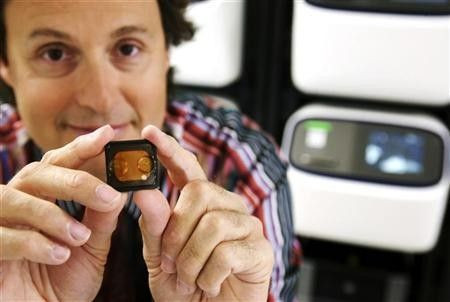Now Decode Your DNA for $1000

The wish to decode your own DNA for as much as $1000 is no longer a pipe-dream. A new bio-technological innovation has made it possible to sequence an individual's genome in a day's time for $1000.
It would no longer be difficult to say It's all in the genes, and this time, a copy of one's own gene map could prove that point.
The success of the cost-effective new DNA decoding machine could be an important step in making individual genome data readily available for medical care. The sequencer machine has been developed to identify the sequence of close to three billion chemical building blocks that make up a person's DNA.
The new innovation in the $1000 sequencing market seems to be getting competitive with other companies expected to join the fray.
Sequencing a human genome currently cost anywhere close to $3,000-$10,000 with the earliest results obtained within a week's time. The cheap options available currently enable to get only 'a chip of the old block' gene map. These services enable to track ancestry or susceptibility to a few diseases but, the new technology launched is expected to map a person's entire genetic makeup.
In a recent official release, Life Technologies Corporation stated that their Ion Proton Sequencer, priced at $149,000, is based on the next generation of semiconductor sequencing technology that has made its predecessor, the Ion Personal Genome Machine (PGM), the fastest-selling sequencer in the world.
Announcing the market launch of the product, the company explained that the benchtop Ion PGM Sequencer is ideal for sequencing genes, small genomes, panels of genes, or performing gene expression profiling, for as little as $99 a chip.
An advantage of the Ion PGMTM Sequencer is speed, simplicity and scalability that can make it an ideal platform to extend into diagnostics. Life Technologies will seek FDA clearance for the Ion PGMTM platform in 2012.
The company developed its first sequencer, Ion Torrent, now part of the Life Technologies conglomerate. In comparison with the market leader, Illumina, the Ion Torrent is comaparable in terms of cost and throughput.
Just six months after our first semiconductor sequencing chip was released, people used it to solve the German E. coli outbreak, sequencing the toxic strain in just a couple of hours, said Dr. Jonathan M. Rothberg, the Founder and CEO of the Ion Torrent division. Now, six months later we're developing a chip that's 1,000 times more powerful than that to sequence an entire human genome in about the same amount of time. That's the power that semiconductors bring to sequencing.
The new technology using the Ion PGM Sequencer is expected to bring down data interpretation time to a day as it utilizes the semiconductor technology by reading DNA directly from its chemical configuration. This is an advantage over the currently used optical technology by which individual DNA elements are tagged using a fluorescent marker.
The challenge in the field is to interpret the data gathered and convert them into knowledge packs. The advantage of the new machine will be to gather more information on gene links and diseases and guiding patients to their respective treatments as per their genetic profiles obtained by decoding the sequences.
The company states that to tide over the data interpretation problem, Ion Torrent has sponsored a collaborative effort with Carnegie Mellon University to develop open-source software that will help clinicians interpret and understand genetic data for meaningful application.
The huge variation in human genome sequence between individuals has always been an obstacle to understanding how to use sequence information to improve human health, said Dr. Robert F. Murphy, director of the Lane Center for Computational Biology in Carnegie Mellon's School of Computer Science, who will lead the multidisciplinary CMU team.
We believe new machine learning approaches will enable interpretation of personal genome sequences to help doctors diagnose and guide treatment in the near future.
© Copyright IBTimes 2024. All rights reserved.





















